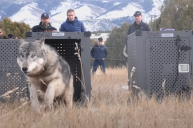Citing "obstruction," House Republicans advanced their investigation into the federal government's plan to protect gray wolf populations. In a letter to the U.S. Fish & Wildlife Service, Congressman Bruce Westerman said the agency failed to respond to questions about its National Recovery Plan for gray wolves.
"Your silence and lack of a response to the Committee Letter suggest that the Service is deliberately engaging in obstruction to frustrate the oversight power of Congress," Westerman wrote. He added that the American people deserved "transparency" and that his Committee would use "every tool at its disposal," including subpoenas, to get answers.
Westerman and his fellow Republicans on the House Natural Resources Committee sent the initial letter in February. They argued that gray wolf populations were high enough to be delisted. They also questioned why wolves should needed re-listing in states where, according to the service's own research, they thrived.
Continuing the fight over gray wolf protections
The debate over who — the feds or states — should manage gray wolf populations has been going on for years. Since 2007, the service has published several proposals to delist them from the Endangered Species Act. After multiple proposals and court battles, the feds delisted wolves in three states.
However, the latest news in the fight happened on May 1, when the House of Representatives passed a bill to delist gray wolves. Colorado Congresswoman Lauren Boebert, who proposed the measure, argued that keeping protections for wolves "puts people ahead of violent predators." Democrats, who largely voted against it, called that measure specious at best.
California Congressman Jared Huffman described Boebert's bill as relying on "narratives that seem like a mix of Little Red Riding Hood and YouTube conspiracies about the Chupacabra." He argued that in the states where wolves were delisted, lawmakers created plans based on "stubborn, anti-predator myths."
Ahead of the vote, a USFWS official told lawmakers at a hearing in March that the service opposed the measure. The official described the administrative rulemaking process as a better process for managing gray wolf populations. He said proposals are based on the best available scientific and commercial data.
Westerman said that he expects the Service to comply with the Committee's requests by June 6.




